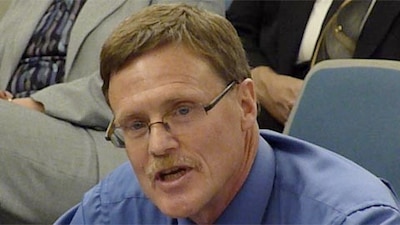One of the main plaintiffs’ witnesses in the Lobato v. State school funding lawsuit testified Monday that his study projects Colorado needs to spent $10.3 billion a year on K-12 schools, an increase of $3.6 billion.
Justin Silverstein is vice president of Augenblick, Palaich and Associates, a Denver-based research and consulting firm that produced a 96-page study projecting the funding Colorado school districts would need to support the demands of state requirements such as new content standards, tests and teacher evaluation systems. The firm was paid $115,000 by the plaintiffs for the study.
Other witnesses Monday included superintendents of two eastern plains districts, who provided chapter and verse on the joys – and financial challenges – of running tiny districts.
The central claim of the plaintiffs’ case is that Colorado’s school funding system doesn’t meet the state constitution’s standard for a “thorough and uniform” public school system.
Lawyers are working to build that case through the testimony of a series of expert witnesses such as superintendents, other administrators and outside experts such as Silverstein and Rutgers University Professor Bruce Baker, who testified last Friday.
On cross examination, lawyers for the attorney general’s office are trying to counter all the gloom-and-doom testimony by prodding plaintiffs’ witnesses with questions that seek to elicit answers about the good things happening in witnesses’ districts. (The state won’t present its own witnesses until near the end of the month.)
The Augenblick study reviewed school finance through two methods, the first an examination of what high-performing districts currently spend. The second method is an estimation, done by panels of education experts, on the cost of fully meeting state standards and of supporting the true costs of at-risk students. The estimates were based on actual school spending in 2008-09. The study also assumes eight more school days than now required and full-day kindergarten in all districts. The study did not include transportation, food service or construction programs.
Most of Silverstein’s testimony – and cross-examination by lawyers for that state – focused on the second method, known as the professional judgment model.
That model created six hypothetical “model” school districts designed to represent key types among the state’s actual 178 districts. Some 80 professionals on several panels developed the models for different levels of schools and types of districts.
Senior Assistant Attorney General Carey Markel pressed Silverstein on several issues, including the validity of the professional judgment model, whether APA had ever done a study in which it didn’t recommend increased funding, whether APA ever did follow-up on states where funding was increased and on the makeup of the Colorado panels.
Silverstein said APA hadn’t followed up on achievement levels in states where funding had risen, and as to the panel, replied, “The best people to talk to are the people who are going to have to implement [reform].”
Highlights of the day:
TONE: Beyond the sometimes-numbing detail of Silverstein’s testimony, the day provided some interesting insights into the daily challenges of small rural school districts, as related by Bethune Superintendent Shila Adolf and Superintendent Gerald Keefe of Kit Carson.
At one point Adolf said, “I have lots of hats.” Lawyer Kathleen Gebhardt asked, “Describe your hats, please,” and Adolf rattled off duties like evaluating staff, professional development, data analysis, budget, filling out state forms and student discipline.
Adolf is a graduate of Bethune High School and has spent her entire career in the district after her teaching training at the University of Northern Colorado.
Keefe cited similar duties – plus coaching and driving a bus at times. Both districts are west of the Kansas line in east-center Colorado and have fewer than 150 students each.
QUOTE: “It’s a horrifying process, to be very honest with you,” Adolf said after being asked what’s involved in preparing a district improvement plan for the Department of Education.
MANEUVERING: Merkel was up to the defense’s usual tactics when cross-examining Adolf about what Merkel seemed to feel with inconsistences between Adolf’s testimony and her deposition, given before the trial began. They were going back and forth over Adolf’s opinion of a sign in Bethune that says it has “the best little school district in Colorado.”
Adolf said she felt that wasn’t true, even though Merkel said Adolf expressed a different opinion in the deposition. “I decided that was a trick question” after she gave her deposition, Adolf said.
“So that was a trick sign?” asked Merkel, hastening to assure, “I’m certainly not trying to trick you.”
“I guess it’s fair to say that I’ve changed my answer,” said Adolf.
DOCUMENTS: Read the APA funding report here, and check out a district-by-district list of what the study says funding should be.
Read detailed background on the case here and see our archive of Lobato stories.

COLOR: Adolf spoke so rapidly during her more than two hours of testimony that Gebhardt and District Judge Sheila Rappaport more than once gently reminded her to slow down so the court reporter could keep up. “Slow, slow, slow,” Gebhardt said at one point. After she was finished, Adolf went to the back of the courtroom, hugged Keefe and whispered, “Good luck” before he took the witness stand. He didn’t have any problems.
UPCOMING: Aurora Superintendent John Barry is scheduled to take the stand on Tuesday. The Aurora district is a plaintiff in the case. Jeffco Superintendent Cindy Stevenson testified for the plaintiffs last week.
